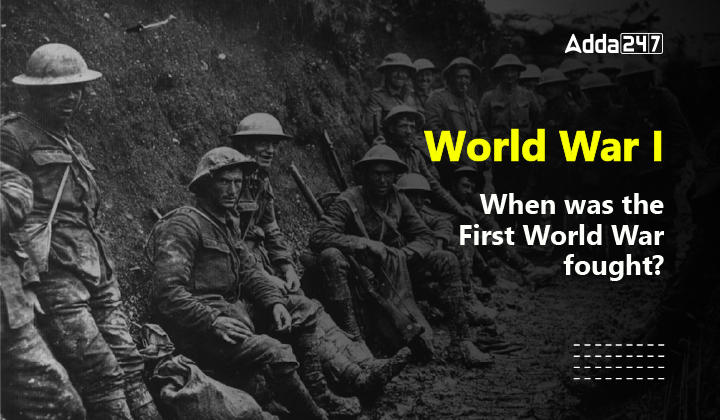Table of Contents
One of the deadliest global wars in the history of mankind was World War I, also known as the First World War or simply WWI. The war broke out in several parts of East Asia, the Pacific, the Middle East, Africa, and Europe. It can be said that World War I shaped the world and the course of modern history, therefore, it is of paramount importance to gather knowledge on WWI. Government Teaching Job Aspirants must go through the following article on Pratham Vishv Yudh Kab Hua Tha? When First World War was Fought? to understand the magnitude and intricacies of World War I.
What is World War I?
World War I was fought between 1914 and 1918. World War I began on 28 July 1914, with the assassination of Archduke Franz Ferdinand of Austria-Hungary and lasted until 11 November 1918, when an armistice was signed. The conflict involved many countries from around the world and had a profound impact on global politics, societies, and economies. It is often referred to as the “Great War” or the “War to End All Wars” due to its scale and devastating consequences.
The immediate cause of the outbreak of the Great War (World War I) was the assassination of the Austrian Archduke Franz Ferdinand on 28 June 1914. Right after the demise, the following chain of events happened: Austria declared war on Serbia on July 28. An understanding of the First World War is essential for the comprehension of candidates in the history and world politics section in government exams.
The Outbreak of War – An Overview
Serbian nationalists returned to the idea of “liberating” the South Slavs of Austria-Hungary after the two Balkan Wars (1912–13, 1913) had greatly boosted Serbia’s prestige. In addition to leading the secret society Union or Death as “Apis,” Colonel Dragutin Dimitrijevi, chief of Serbia’s military intelligence, was devoted to pursuing this pan-Serbian goal.
The Austrian archduke Franz Ferdinand, the presumed heir to the Austrian emperor Franz Joseph, was set to travel to Bosnia for a military inspection tour when Apis learned of it. Apis reasoned that the death of the Archduke would benefit the Serbs’ cause.
The World War Begins
The Serbian government ordered the mobilization of the Serbian army and made a request for aid from Russia after coming to the conclusion that Austria-Hungary was preparing for war. When Austria-Hungary declared war on Serbia on July 28, the tense truce between the continent’s major nations was rapidly broken. Russia, Belgium, France, Great Britain, and Serbia formed an alliance against Austria-Hungary and Germany within a week, sparking the commencement of World War I.
Causes of World War I
Several causes triggered the occurrence of the first world war. Such incidents had been taking place way before the war actually commenced.
- Alliances – Alliances were mutual military contracts between countries that stoked rivalry and hostility.
- Imperialism – Imperialism served the purpose of enhancing the strength of nations, which caused conflict between nations. Imperialism was utilized by both Germany and Britain to expand their empires, which caused hostility between them. In order to establish their empires and increase their holdings, many European nations engaged in imperialism. As they competed to become the most powerful country in Europe, this led to rivalry and conflict among the European countries.
- Nationalism – One of the main causes of World War I was nationalism. Instead of choosing their allegiance based on common interests or principles, it forced people to consider their racial or cultural heritage.
- Arming for Battle – There was a demand for larger and more potent weapons as a result of countries investing a lot of time and money in building massive militaries.
Chronology of Events of World War I
For a better understanding of the causes of WWI, there’s a table below outlining the events before and during the war for easy reference.
| Chronology of Events of World War I | |
| Year | Event |
| 1878 | Serbia gained independence from the Ottoman Empire |
| 1881 | Germany, Austria-Hungary and Italy form the Triple Alliance to defend each other in the event of war |
| 1904 | Britain forms the Entente Cordiale with France |
| 1907 | Russia Joins with Britain to form the Triple Entente |
| 1908 | Austria-Hungary Occupies Bosnia-Herzegovina to stop Serbia from taking control |
| 1912-1913 | Balkan Wars are fought between the Balkan League (Serbia, Bulgaria, Greece and Montenegro). The Balkan League is victorious |
| 1914 – June 28 | Gavrilo Princip assassinated Archduke Franz Ferdinand in Sarajevo |
| 1914 – July 28 | Austria declares war on Serbia. Russia prepares to defend Serbia from Austria |
| 1914 – August 1 | Germany declares war on Russia to defend Austria |
| 1914 – August 3 | Germany Declares war on France, Russia’s ally |
| 1914 – August 4 | German armies march through Belgium to France. Britain declares war on Germany. World War I begins |
| 1914 – August 26 | Germany defeats Russian forces at the Battle of Tannenberg |
| 1914 – September | At the battle of the Marne, the Allies halted the German advance on Paris. German victory in the same month ends Russian involvement in East Prussia. |
| 1914 – November | At the end of the battle of Ypres, German forces are prevented from itching the English Channel |
What made World War I unique?
The fact that World War I was fought from parallel trench lines that were only separated by a small area of land known as “no man’s land” was what set it apart from other battles. Because both sides’ weapons were so powerful, quick, and accurate, trench warfare was required because it was difficult to engage in open combat.
When soldiers did leave the trenches to make an attack, they only gained a few metres, and the cost of lives was high. This resulted in a deadlock that persisted from the end of 1914 to the summer of 1918. Even the use of cutting-edge weapons like tanks, nerve gas, and airplanes failed to alter the situation.
Treaty of Versailles
Allied leaders expressed their ambition to create a post-war society that would protect itself against future battles of such a destructive scale at the 1919 Paris Peace Conference.
Even some participants had started referring to World War I as “the War to End All Wars.” However, the Treaty of Versailles, which was signed on June 28, 1919, would fall short of that aspiration.
Germany was disappointed after signing the treaty because it believed any peace would be “peace without victory,” as put forth by President Wilson in his famous Fourteen Points address of January 1918. Germany felt burdened with war guilt, large reparations, and being denied entry into the League of Nations.
As the years went by, Germany’s animosity against the Versailles Treaty and its drafters developed into a simmering bitterness that is believed to have contributed to the outbreak of World War II two decades later.
End of the War
A series of causes led to an abrupt end of the First World War. Food and fuel got scarce in Germany. There was significant turmoil after the German navy rebelled. On November 9, German Emperor Kaiser William II abdicated, and on November 11, 1918, Germany and the Allies signed an armistice to end the war. The war was formally ended by the Allies at the Paris Peace Conference. It drafted the Treaty of Versailles, which imposed peace on Germany and held Germany solely accountable for beginning the war.



 UGC NET Notification 2025 Out, Exam Date...
UGC NET Notification 2025 Out, Exam Date...
 Last Minute Preparation Tips for MP TET ...
Last Minute Preparation Tips for MP TET ...
 GAT B Cut Off 2025, Check Expected, Cate...
GAT B Cut Off 2025, Check Expected, Cate...














